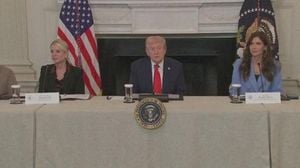When Robert F. Kennedy Jr. was appointed Secretary of Health and Human Services, the move sent ripples through both the scientific and political communities. As reported by Jonathan Saltzman in The Boston Globe on August 17, 2025, Kennedy's policies, particularly his opposition to mRNA vaccines due to safety concerns, have ignited fierce debate and, some argue, jeopardized America's standing as a leader in biotechnology. The controversy is not just about science—it’s about the intersection of politics, public trust, and the future of medical innovation in the United States.
Kennedy’s actions have had immediate and far-reaching effects. According to Saltzman, the administration’s skepticism toward mRNA vaccine technology has led to a "brain drain effect," with research and investment shifting overseas. Venture capitalists, once eager to back American biotech startups like Corner Therapeutics, are now redirecting their funds to European and Asian labs. The result? Breakthroughs in cancer treatments and rare disease therapies may soon bear foreign, not American, stamps.
Y. Tony Yang, an endowed professor in health policy at George Washington University, highlighted the economic and scientific stakes in his letter to The Boston Globe: “When venture capitalists withdraw from domestic mRNA investments, as Corner Therapeutics experienced, they don’t abandon the technology—they fund it elsewhere. This means breakthrough cancer treatments and rare disease therapies will probably emerge from European or Asian labs, not American ones.” Yang’s warning is clear: the United States risks not only losing profits but also its edge in global health innovation.
But the implications extend beyond dollars and patents. Yang also noted the dangerous precedent being set by allowing political hostility toward a specific molecular mechanism to override scientific evidence. “If political hostility toward a specific molecular mechanism can override scientific evidence, what prevents future administrations from targeting other promising technologies based on public sentiment rather than data?” he asked. The mRNA platform, he emphasized, has shown extraordinary versatility, from cancer immunotherapy to treating genetic disorders. To let politics dictate its fate is, in his view, a grave misstep.
There’s a bitter irony at play, too. Dr. Elias Sayour, a pediatric oncologist, pointed out that the Trump administration’s initial Operation Warp Speed championed mRNA technology—only for the current administration to now undermine it. This policy reversal, Sayour and Yang argue, could damage America’s reputation as a reliable research partner, particularly when the next pandemic inevitably emerges. International collaboration, already strained, may become even more precarious.
The outcry isn’t limited to policy experts. Letters to the editor published in The Boston Globe reflect a groundswell of public concern. Laura Andrews of Watertown wrote, “After reading Jonathan Saltzman’s article about the Trump administration’s opposition to messenger RNA technology, I am saddened and outraged that more citizens are not tuning into this war against scientific health research in the United States.” She questioned why more Americans aren’t protesting cuts to medical research that could affect everyone, regardless of political affiliation. “Disease victims and their families are in every political party and all over this country. Why are we not seeing more people railing against the cuts in medical research and the impact they have on the hopes of what mRNA might mean to people everywhere?”
For some, the issue is deeply personal. Lynn Cooke of Rockport, Maine, shared her family’s loss to glioblastoma, the most aggressive type of brain tumor, and her friend’s ongoing struggle with the same disease. “Of course I want research to continue. People die without vaccines. It’s common sense to support this work. Are we complacent to the fact that funding is to be cut on mRNA vaccines, threatening the recent breakthrough development of their use in treating glioblastoma and other diseases? I’m not.” Cooke’s plea underscores the human cost of policy decisions that may seem abstract in Washington but are felt acutely in homes across the country.
Others have taken issue with Kennedy’s broader approach to public health. Malcolm Odell, a former Peace Corps volunteer and lifelong supporter of the Kennedy family, expressed dismay at what he sees as a betrayal of the family’s legacy. “His recent challenge to lifesaving mRNA research is only his latest attack on the Centers for Disease Control and Prevention and the National Institutes of Health and their historic missions,” Odell wrote. He also criticized Kennedy’s promotion of misinformation about measles, HIV, and autism, and his attacks on respected medical journals. “His dangerous intrusion into our scientific community and his support of our criminal president undermine everything his uncles and father worked so hard to achieve.”
The criticism has not been limited to the left or to medical professionals. Calley Means, a former Republican lobbyist, voiced a common misconception in the wake of Kennedy’s appointment: “The public health expert class has given us a public health collapse. We are on the verge of, at best, a health crisis and, at worst, a societal collapse with 20% of GDP going to health expenditures.” This narrative, as Mona Charen explained in The Bulwark on August 22, 2025, feeds into a broader distrust of institutions and expertise that has become a hallmark of the Trump movement.
Charen’s analysis is stark. She argues that while chronic health conditions like diabetes, heart disease, and obesity are mainly driven by behaviors—poor diet, lack of exercise, smoking, and drinking—government still plays a crucial role in infectious disease prevention, drug research, and funding scientific studies. Yet, on all these fronts, Kennedy is “doing the exact opposite of what he should.” According to Charen, Kennedy has disbanded advisory committees of academics and physicians, canceled funding for mRNA vaccine research, changed COVID vaccine recommendations for pregnant women and babies, and created a panel to reexamine the thoroughly debunked link between the MMR vaccine and autism.
The consequences, Charen warns, are dire: “It is very probable, if he is not stopped, that former plagues like measles will make a big comeback; that we will be far less prepared to cope with the next epidemic because we cut research on the miracle of mRNA technology; that rates of vaccine hesitancy will continue to rise; and that trust in government professionalism will be shattered.”
Charen also points to sobering statistics: only 2.7% of American adults follow the five key recommendations for healthy living—eating well, exercising, avoiding cigarettes, drinking alcohol in moderation, and maintaining a healthy weight. A study in Circulation found that women who follow these guidelines live an average of 14 years longer, and men 12 years longer. Yet, as Charen notes, the real threat to public health isn’t food dyes or Wi-Fi, but the erosion of government’s basic responsibilities—like funding research and providing expert guidance on vaccines.
As the debate rages on, one thing is clear: the intersection of science policy and politics has never been more fraught. The choices made today will shape not just the next generation of medical breakthroughs, but the very fabric of public trust in American institutions.




